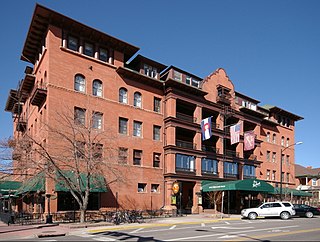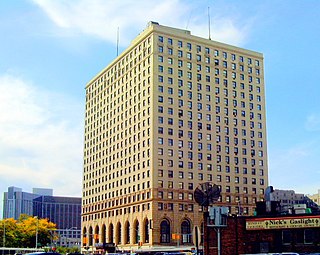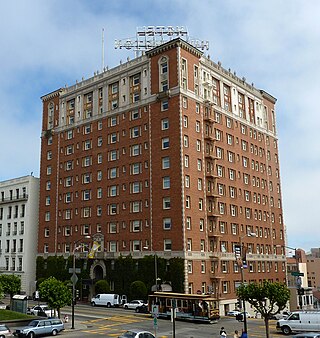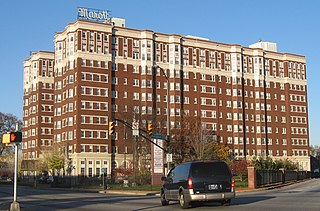
Hotel Adolphus is an upscale hotel in the Main Street District of Downtown Dallas Dallas, Texas. A Dallas Landmark, it was for several years the tallest building in the state. Today, the hotel is part of Marriott Hotel's Autograph Collection.

The Magnolia Hotel is a 29-story, Beaux-Arts style, upscale hotel in the Main Street District of downtown Dallas, Texas, that for many years was the tallest building in the state after surpassing the Adolphus Hotel. The structure is a Dallas Landmark and is listed on the National Register of Historic Places.

The Grant–Kohrs Ranch National Historic Site, created in 1972, commemorates the Western cattle industry from its 1850s inception through recent times. The original ranch was established in 1862 by a Canadian fur trader, Johnny Grant, at Cottonwood Creek, Montana, along the banks of the Clark Fork river. The ranch was later expanded by a cattle baron, Conrad Kohrs (1866–1920). The 1,618 acres (6.55 km2) historic site is maintained today as a working ranch by the National Park Service.

Buildings, sites, districts, and objects in Virginia listed on the National Register of Historic Places:

The Driskill, a Romanesque-style building completed in 1886, is the oldest operating hotel in Austin, Texas, United States, and one of the best-known hotels in Texas generally. The Driskill was conceived and built by Col. Jesse Driskill, a cattleman who spent his fortune constructing "the finest hotel south of St. Louis".

The El Vernona Hotel–John Ringling Hotel was a famous hotel located at 111 North Tamiami Trail in Sarasota, Florida, United States.

The Hotel Boulderado is located at 13th and Spruce St. in downtown Boulder, Colorado. It opened its doors on New Year's Day 1909 and is considered Boulder's first luxury hotel. The original 1908 Otis Elevator is still in operation.

The St. Anthony, a Luxury Collection Hotel, San Antonio is a historic 10-story hotel in downtown San Antonio, Texas, USA. Built in 1909, it was considered one of the most luxurious hotels in the United States and hosted a wide range of film stars, royalty, and other famous guests. It is listed on the National Register of Historic Places.

The Belcrest Apartments is an apartment building located at 5440 Cass Avenue in Midtown Detroit, Michigan. It was built in 1926 as the Belcrest Hotel, designated a Michigan State Historic Site in 1983, and listed on the National Register of Historic Places in 1984. It is significant as an early example of the apartment hotel development concept in Detroit, and a major early work of architect Charles N. Agree.

The Park Shelton is a historic condominium building located at 15 East Kirby Street in Midtown Detroit, Michigan. Built in 1926 as The Wardell hotel, the building was therefore listed under this name in the National Register of Historic Places in 2007.

The Eastern Slope Inn is a historic hotel at 2760 White Mountain Highway in North Conway, Carroll County, New Hampshire. Built in 1926, it is one of the community's most prominent examples of large-scale Colonial Revival architecture, and is historically important as a major element in the popularization of downhill skiing in the area. The inn was listed on the National Register of Historic Places in 1982.

The Detroit-Leland Hotel is a historic hotel located at 400 Bagley Street in Downtown Detroit, Michigan. It is the oldest continuously operating hotel in downtown Detroit, and was listed on the National Register of Historic Places in 2005. The ballroom of the Detroit-Leland has hosted a nightclub, the City Club, since 1983. The hotel is now named The Leland and no longer rents to overnight guests.

Weeks and Day was an American architectural firm founded in 1916 by architect Charles Peter Weeks (1870–1928) and engineer William Peyton Day (1886–1966).

Fort Armstrong Hotel is a historic building located in downtown Rock Island, Illinois, United States. It was individually listed on the National Register of Historic Places in 1984. In 2020 it was included as a contributing property in the Downtown Rock Island Historic District. The hotel was named for Fort Armstrong, a fortification that sat in the middle of the Mississippi River near the present location of the Rock Island Arsenal. The building now serves as an apartment building.

The Read House Hotel is a historic hotel in Chattanooga, Tennessee, founded in 1872. The 141-room main building dates to 1926, and is listed on the National Register of Historic Places for Hamilton County. The 100-room rear wing was added in 1962, originally as a motel.

Greenwood Memory Lawn Mortuary & Cemetery is the official name given to a cemetery located at 2300 West Van Buren Street in Phoenix, Arizona owned by Dignity Memorial. The cemetery, which resulted as a merger of two historical cemeteries, Greenwood Memorial Park and Memory Lawn Memorial Park, is the final resting place of various notable former residents of Arizona. Pioneers, governors, congressman, government officials, journalists, race car drivers, soldiers, actors and actresses are among the many notable decedents who are interred in the cemetery.

Marott Hotel is a historic residential hotel building located at Indianapolis, Indiana. It was built in 1926, and consists of two 11-story, reinforced concrete structures faced in red brick with ornamental terra cotta and glazed tile trim in the Georgian Revival style. The two towers are connected by a one-story structure that contained the lobby, event halls, gym, and indoor pool.

The Greenwood Park Plats Historic District is a nationally recognized historic district located in Des Moines, Iowa, United States. It was listed on the National Register of Historic Places in 2013. At the time of its nomination the district consisted of 393 resources, including 277 contributing buildings, one contributing site, 109 non-contributing buildings, and six non-contributing structures. Most of this district was originally known as Brown's Park, a private park that was the location of the Iowa State Fair from 1879 to 1885. Founded privately in 1854, the fair was held in several locations in the state making it more of a regional event. It was also not profitable. That changed when the fair moved to this location, and its profitability eventually led to funding from the Iowa General Assembly and a permanent location on the east side of the city. Brown's Park continued for a while longer and the streetcar line from Des Moines opened in 1889.




















